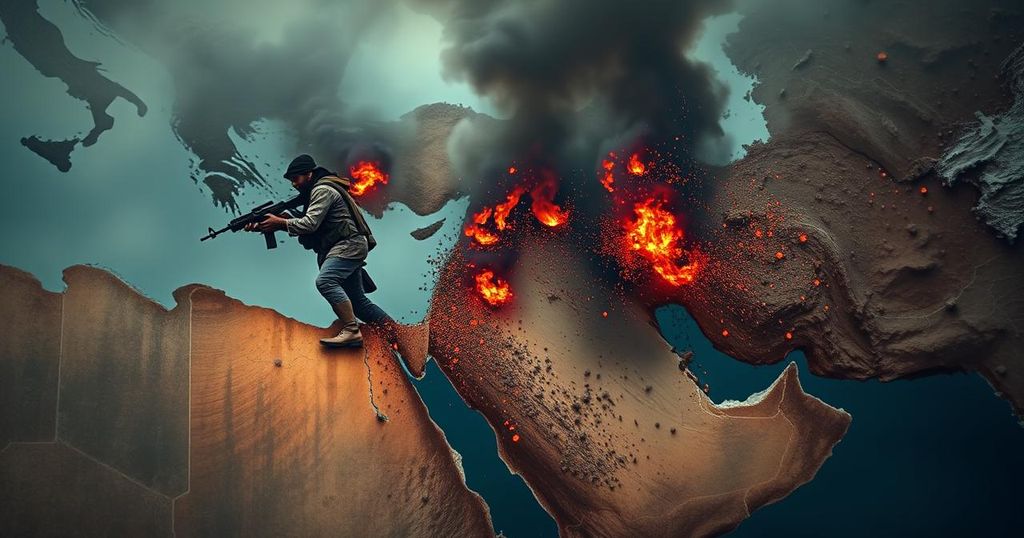Iranian-linked militias in Iraq have launched around 40 attacks on Israel in recent weeks, escalating a covert proxy battle following the death of Hezbollah leader Hassan Nasrallah. With tensions high amid ongoing conflicts, these militias are increasingly utilized by Iran to project military capability and support amid regional instability.
In recent weeks, Iranian-aligned militias in Iraq have significantly escalated their attacks on Israel, launching approximately 40 strikes utilizing missiles, drones, and rockets over the past two and a half weeks. This uptick is part of a covert proxy conflict that has unfolded throughout the Middle East. The assaults, which began amidst the Gaza conflict last October, intensified following the Israeli airstrike that killed Hezbollah leader Hassan Nasrallah on September 27, 2023. Hezbollah, benefitting from Iranian support for over four decades, serves as a key component in the broader coalition of militant groups that Iran has developed. With Hamas appearing notably weakened from prolonged conflict in Gaza and Hezbollah facing ongoing Israeli military actions in Lebanon, Iran has increasingly relied on lower-tier factions within its support network to engage against Israel. Michael Knights, an analyst from the Washington Institute, emphasized the surge in attacks from Iraq, stating, “The number of missiles and drones being fired from Iraq [at Israel] has gone through the roof. They’ve moved into a higher gear to demonstrate their support for Hezbollah.” These missile launches exemplify Iran’s strategy of utilizing its “axis of resistance” to unify its proxies in response to Israeli threats, while also showcasing intra-faction competition. Analysts warn that Iran’s proxies across Syria, Iraq, and Yemen, including the Houthi militia, present potential retaliation targets for Israel following substantial ballistic missile barrages from Iran aimed at Israel. In the previous year, Israel has conducted numerous airstrikes against Iranian-aligned entities in Syria to protect vital supply routes to Hezbollah. Recent intelligence suggests that an Israeli operation targeted a weapons production facility linked to Iran in Syria, signifying continued efforts to diminish Iranian military capabilities in the region. Moreover, the coordination between proxies has reportedly strengthened, particularly as the Iraqi-affiliated Islamic Resistance of Iraq (IRI) and the Houthis seek deeper ties, expanding their operations and influence. As tensions mount, Israel has yet to execute strikes directly in Iraq but remains vigilant, monitoring the strategic developments closely. While the conflict encompassing Iraq and Syria may not be widely covered in global media, analysts like Mr. Knights underscore that “Every big war has its forgotten corners,” accentuating the complexity of this ongoing proxy struggle.
The article discusses the recent surge in missile and drone attacks on Israel by Iran-linked militias based in Iraq, set against the backdrop of shifting dynamics in the Middle East following escalating conflicts. The attacks are analyzed in relation to the broader geopolitical implications, particularly following Israel’s targeted actions against prominent leaders of Iranian-supported groups and the resulting impacts on regional stability.
The intensification of attacks by Iranian-supported militias from Iraq against Israel highlights the evolving proxy warfare landscape in the Middle East. With significant figures such as Hezbollah weakened, Iran’s strategy appears focused on leveraging lesser-sophisticated factions to assert influence against its adversary. The ongoing military confrontation underscores the urgency for Israel and its allies to counter these threats amid a backdrop of complex inter-faction rivalries and geopolitical maneuvering.
Original Source: www.theguardian.com







